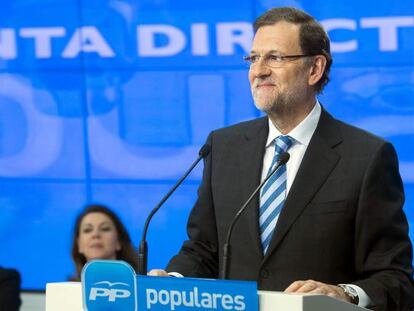PP’s official accounts point to illegal donations recorded by ex-treasurer
Sums party's books coincide with those in Bárcenas' secret ledgers Organization received sums from companies in excess of legal limits
The official accounts sent by the Popular Party (PP) to the High Court and the anticorruption prosecutor's office appear to confirm the illegal donations made to the group as recorded in secret handwritten ledgers allegedly kept by the PP's former treasurer Luis Bárcenas.
Investigators cross-checked Bárcenas' ledgers with the information provided by the PP and found that the amounts given by companies to the party, as noted down by the former treasurer, and the dates the money was handed over are very similar to those reflected in the PP's official accounts, or are the exact sum of different amounts donated around the same time.Bárcenas denies he compiled the ledgers despite the fact that handwriting experts have said otherwise.
According to Bárcenas' notes, over a dozen companies made donations of close to seven million euros to the PP in the years 1990-1993 and 1996-2008. Many of the donations surpassed the legal limit of 60,000 euros.
Most of them were also made by companies that held contracts with public administrations, also prohibited by legislation governing party financing.
The main companies that figure as contributors to the PP as indicated in Bárcenas' notes have denied they made such donations to the party. PP leaders have also denied that the revenues and expenses included in the ledgers correspond to actual revenues and outlays of the party.
Most of the illegal donations were from large construction firms
The sums donated to the party as indicated by Bárcenas could not have gone through official channels because of their illicit nature. This points to illegal financing of the party, which High Court Judge Pablo Ruz is investigating as part of the Gürtel kickbacks-for-contracts corruption probe.
The law on party financing that was in place between 1987 and July, 2007 — practically the entire period covered by Bárcenas' ledgers — states that "parties may not receive, directly or indirectly, contributions from the same individual or corporate body that exceed the sum of 10 million pesetas [60,000 euros]."
It also adds that contributions from "companies that, through an outstanding contract, provide services, carry out work or supply any of the public administrations" are barred. Of the seven million euros in donations in Bárcenas' notes, there are single donations of 250,000 euros by one person and up to 400,000 euros over the course of a year from the same donor.
On more than 30 occasions, donations exceeded the legal limit, which was raised to 100,000 euros in 2007. The alleged payments were made mainly by construction firms, which have been habitually contracted by public administrations. Juan Miguel Villar Mir, the chairman of builder OHL, and Luis del Rivero, the former head of construction group Sacyr Vallehermoso, are among the most prominent businessmen named in Bárcenas' notes. Both have denied making the contributions entered by Bárcenas.
The person who donated the most to the PP is José Luis Sánchez, whose name Bárcenas also notes down as J. L. Sánchez or simply José Luis. Over the course of five years, the person referred to by Bárcenas, who might be Andalusian real estate developer, José Luis Sánchez Domínguez, the chairman and founder of the Sando group, made total contributions to the PP of 1.15 million euros.
Sando said in a statement that “neither Mr Sánchez Domínguez, nor any representative of Sando has handed over any sum of money to the Popular Party or to Mr Bárcenas.”
There are also contributions from people implicated in the Gürtel case such as the case of Pablo Crespo, a former high-ranking figure in the PP’s Galician branch, which exceed the legal limit.
The fine imposed on parties for accepting illegal contributions up until 2007 was twice the amount received. The previous law also states that all contributions should be made “exclusively in bank accounts” which serve solely for this purpose.








































